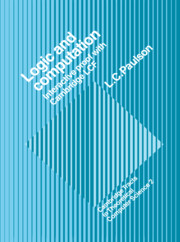
-
Select format
-
- Publisher:
- Cambridge University Press
- Publication date:
- September 2009
- October 1987
- ISBN:
- 9780511526602
- 9780521395601
- Dimensions:
- Weight & Pages:
- Dimensions:
- (247 x 174 mm)
- Weight & Pages:
- 0.574kg, 320 Pages
You may already have access via personal or institutional login
Book description
This book is concerned with techniques for formal theorem-proving, with particular reference to Cambridge LCF (Logic for Computable Functions). Cambridge LCF is a computer program for reasoning about computation. It combines the methods of mathematical logic with domain theory, the basis of the denotational approach to specifying the meaning of program statements. Cambridge LCF is based on an earlier theorem-proving system, Edinburgh LCF, which introduced a design that gives the user flexibility to use and extend the system. A goal of this book is to explain the design, which has been adopted in several other systems. The book consists of two parts. Part I outlines the mathematical preliminaries, elementary logic and domain theory, and explains them at an intuitive level, giving reference to more advanced reading; Part II provides sufficient detail to serve as a reference manual for Cambridge LCF. It will also be a useful guide for implementors of other programs based on the LCF approach.
Reviews
"This book is well-written: it is a good text for any reader who wants to become familiar with Cambridge LCF, or, in general, with machine assisted (formal) proof construction." Mathematical Reviews
Contents
Metrics
Full text views
Full text views help Loading metrics...
Loading metrics...
* Views captured on Cambridge Core between #date#. This data will be updated every 24 hours.
Usage data cannot currently be displayed.
Accessibility standard: Unknown
Why this information is here
This section outlines the accessibility features of this content - including support for screen readers, full keyboard navigation and high-contrast display options. This may not be relevant for you.
Accessibility Information
Accessibility compliance for the PDF of this book is currently unknown and may be updated in the future.


